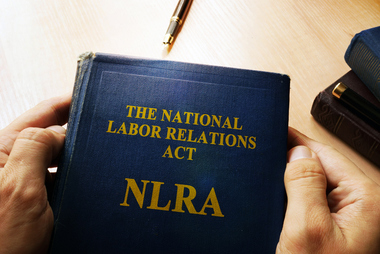The NLRA: What Employers Need To Know

Employers are granted certain degrees of leverage when setting standards for their workplaces, which employees will subsequently be required to adhere to and follow. However, employers of private-sector employees must take the National Labor Relations Act into consideration.
What Is the NLRA?
The NLRA is a federal law designed to grant employees "the right to form or join unions; engage in protected, concerted activities to address or improve working conditions; or refrain from engaging in these activities." The quoted statement is an exact definition from the National Labor Relations Board, which is the federal agency in charge of enforcing the NLRA.
Ultimately, the NLRA is a piece of legislation that protects employees who participate in certain activities in the workplace. While the NLRA covers the majority of U.S. employees who are employed by private-sector employers, public-sector employees do not receive the same level of coverage under the NLRA.
Employees' rights under the NLRA
The NLRA extends to all employees, including the unionized and the nonunionized.
From a union standpoint, employees are granted the right to:
- Create a union at their place of work.
- Participate in a union whether or not the union is recognized by their employer.
- Assist an existing union in the process of organizing fellow employees.
- Actively refuse to participate in any or all of the three aforementioned activities.
- Receive equitable treatment as a result of the union.
From the perspective of nonunion employees, individuals are granted the right to engage in what are known as "concerted activities." The NLRB defines concerted activities as being instances "when two or more employees take action for their mutual aid or protection regarding terms and conditions of employment."
Concerted activities that are protected under the NLRA include the following:
- Two or more employees seeking better pay from their employer.
- Two or more employees who talk, solely amongst themselves, about concerns outside the scope of work-related pay, such as safety issues in the workplace.
- One or more employees speaking with their employer on behalf of their co-workers and in an effort to improve the work conditions of everyone employed by said employer.
What employers cannot do under the NLRA
While the NLRA protects employees' rights to engage in particular activities, the act also prohibits employers from taking action against any employees who exercise their rights under it. Here are some examples of the actions that the NLRA deems illegal in regard to employer-related behavior:
- Transferring, demoting or firing employees.
- Reducing the number of hours an employee works.
- Discouraging employees from enacting their NLRA rights.
- Making threats in the way of closing the workplace if a union is formed among employees.
- Coercing employees by raising their pay in exchange for the acceptance, or lack thereof, regarding union support.
- Forbidding employees who are not on the clock from soliciting for a union during unpaid hours at work, such as while on break or before and after work.
- Preventing employees from adorning themselves in union-related gear, such as a hat with the union's logo or buttons advertising the union, with the exception of few-and-far-between limited cases.
Furthermore, the NLRA has even more specific and protective rules for unions that represent employees who are in the collective bargaining process with their current employers.
Penalties for violating the NLRA
If an employee believes their NLRA rights were violated, they are permitted to file a charge directly with the NLRB. However, the statute of limitations for such a claim is six months immediately after the incident took place. If an employee was ultimately fired, it is possible that the board will require the employer to overturn the firing and rehire the employee, as well as pay said employee the wages and benefits they lost as a result of being fired.
The NLRB will likely also issue a cease and desist order to any and all employers that make the decision to violate the NLRA and the company's employees' rights. While the NLRA currently does not have any civil money penalties in place, Congress may move to change that reality in the near future.
